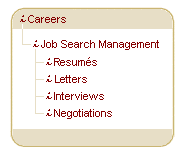|
|
 Careers Careers
 Job Search Management
Job Search Management
Resumes: Letters: Interviews: Negotiations
What you see here is not academic advice, filling hundreds of pages. We offer succinct, practical tips, with examples. In just a few minutes you will be well on your way towards preparing a polished resume, writing compelling cover letters, feeling confident for interviews, and conducting negotiations so that you can reach the most beneficial arrangement with your prospective employer.
|
Resumes:
|
|
Your resume has one purpose: to get you a job interview. The resume (or résumé) is shorter than a curriculum vitae (or CV), which is typically prepared for a position in a university. The resume allows an employer to quickly assess your qualifications. Most resumes are initially read for only 20 seconds. You have that much time to help the employer form a mental picture of who you are and of how you might fit in the organization. Your resume should be an engaging summary of what you can do. The ideal resume is succint, lucid, and a visually appealing overview of your credentials.
|
|
Top 10 Tips
Top 5 Blunders
Strategies (what)
Techniques (how)
Examples (oh, I see now)
Top 300 Action Verbs
Keywords and Hints
FAQs
|
|
Letters:
|
|
All communications with prospective employers, whether by email or by postal mail, require that you write a proper letter. Every letter you send is another point of testing: Can this applicant write correct English? Is there more to learn about this individual? Should we continue to recruit the person who wrote this letter? Writing good letters helps employers to answer yes to all three of these questions.
|
|
Top 10 Tips
Top 5 Blunders
Strategies (what)
Techniques (how)
Examples (oh, I see now)
FAQs
|
|
Negotiations:
|
|
It is highly unlikely that the first offer from your prospective employer is the final offer, in most instances anyway. If you approach it from the "take it or leave it" mindset, you are liable to leave "money on the table" or walk away from what could have been a mutually beneficial relationship. Assuming that you are interested in the position, the appropriate response to a job offer should thus be, "let's talk" - that is, move forward with negotiations.
|
|
Top 10 Tips
Top 5 Blunders
Strategies (what)
Techniques (how)
Examples (oh, I see now)
FAQs
|

|
 |

 Careers
Careers


 Job Search Management
Job Search Management
